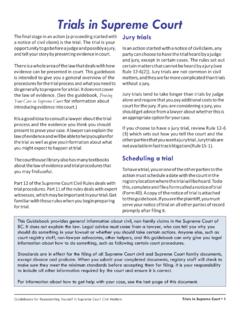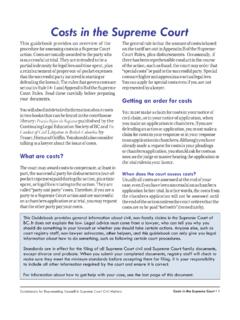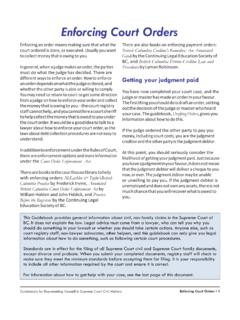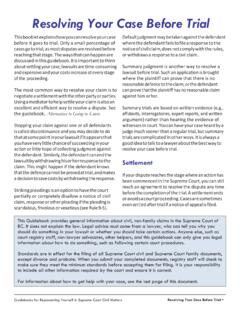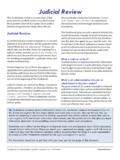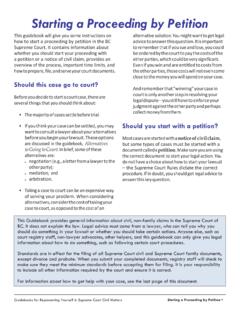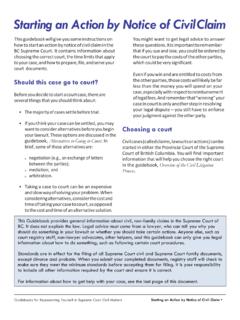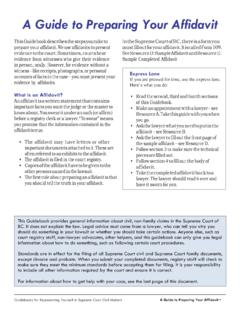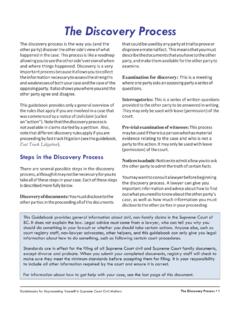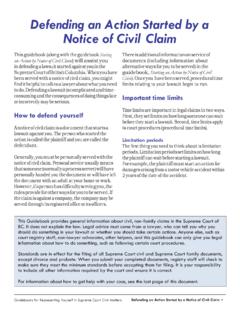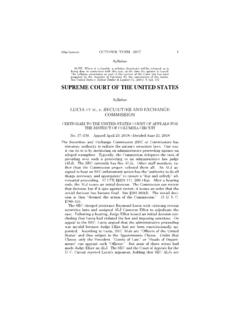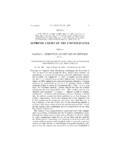Transcription of Applications to Court
1 Applications to Court This guidebook contains an overview of the procedure for Applications , set out in Part 8 of the rules. In addition Rule 22-1 provides general rules on what are known as chambers proceedings and Rule 22-2 provides the rules on any affidavits that may be submitted with Applications . Applications are used to ask the Court to make an order to resolve issues that come up in your case before the trial of the lawsuit. However, depending on the type of application you make, an application can also result in a final decision in your case. For example, an application for summary judgment may result in a final decision. What are chambers proceedings?
2 The term chambers is used to describe a type of hearing that is different from a full trial where evidence is given through witnesses. Chambers proceedings differ from trials in these ways: evidence is generally presented in the form of affidavits (instead of by witnesses); lawyers and the judge do not wear robes; and they can be scheduled for any day on which the Court sits in chambers; trial dates have to be reserved with the trial scheduling division of the registry. In proceedings that start with a notice of civil claim, Applications usually deal with procedural issues that come up as your case proceeds through the steps leading to trial. For example, you may believe another party has documents he or she hasn t produced or you may be having trouble getting another party to show up at an examination for discovery.
3 In this case, you can apply to the Court for an order that the party produce documents or show up at an examination for discovery. These are practical problems that can come up in moving your case forward and they are often the subject of Applications . All Applications are heard in chambers. This does not mean that they are heard in the judge s chambers or office they are still heard in open Court and the hearings are audio taped. If your action is under Rule 15-1 for Fast Track Litigation, you are not allowed to make an application unless a case planning conference or a trial management conference has been held (subject to the exceptions listed in Rule 15-1(8)).
4 Should you make an application? If you think you have a problem in your case that could be resolved by a Court order and you have been unable to agree with the other party on how to resolve it, you may have to make an application to Court . Guidebooks for Representing Yourself in Supreme Court Civil Matters Applications to Court 1 This Guidebook provides general information about civil, non-family claims in the Supreme Court of BC. It does not explain the law. Legal advice must come from a lawyer, who can tell you why you should do something in your lawsuit or whether you should take certain actions. Anyone else, such as Court registry staff, non-lawyer advocates, other helpers, and this guidebook can only give you legal information about how to do something, such as following certain Court procedures.
5 Standards are in effect for the filing of all Supreme Court civil and Supreme Court family documents, except divorce and probate. When you submit your completed documents, registry staff will check to make sure they meet the minimum standards before accepting them for filing. It is your responsibility to include all other information required by the Court and ensure it is correct. For information about how to get help with your case, see the last page of this document. Because you will have to appear before a judge or master in Court , you will want to make sure that: you know that the problem you re trying to solve is one that can be resolved by an application; you understand the law and the rules governing your application; you have followed all the rules and met all the deadlines governing Applications ; you have all the correct documents; and you are prepared to argue your application before a judge or a master.
6 A lawyer can help you determine whether you need to file an application. A lawyer can also find the law that applies to your problem and complete the proper forms. Remember that preparing for and attending at a chambers application will cost you time and money. First, try to resolve the problem without resorting to a Court application. What rules apply? There are several rules governing Applications and you will need to understand how each of them applies to your case: Rule 8-1: sets out what documents need to be prepared and delivered to the other parties and the time limits that apply. Rule 8-2: explains where the application should be heard. Rule 8-3: describes how you can get a Court order if everyone consents to it.
7 Rule 8-4: describes how to make an application when you do not need to notify the other parties. Rule 8-5: tells you how to make an urgent application, where you don t have to give notice to the other party. If the judge at a case planning conference makes an order that an application can be made by written submissions, Rule 8-6 tells you how to do that. Rule 8-1( ): tells you how to reset an application that has been adjourned without a new date set for it to be heard ( , adjourned generally). Rule 22-1: sets out what happens generally in chambers proceedings. Rule 22-2: explains how affidavits must be prepared and filed with the Court . Rule 23-6: sets out what masters can deal with and how to appeal a master s decision.
8 Who can make a decision in the application? Both judges and masters hear Applications ; however, in most cases a master will hear your application. When preparing the documents for your application, you must state whether your application is within the jurisdiction of (in other words, can be heard by) a judge or master. In general, a master cannot hear an application that results in a final order (one that ends the case). This means that you would not appear before a master for a summary trial. Make sure that you know whether your application needs to be heard by a judge. If you appear before a master who cannot hear your application, you will be forced to reschedule your hearing.
9 The registry staff may be able to help you determine whether a judge or a master should hear your application. Preparing for an application A large part of preparing for an application is preparing the evidence that will be considered by the judge or master in deciding whether to grant the order requested in the application. All the evidence in chambers is presented to the Court by affidavit. For this reason, you must document and keep organized everything you do to try to resolve the procedural issues you may have with the other party. 2 Applications to Court Guidebooks for Representing Yourself in Supreme Court Civil Matters Keep copies of all your request letters (including fax confirmations and/or delivery slips) and make notes of telephone calls you ve made.
10 These documents may form part of the affidavit you prepare for your application. One of the most useful things you can do to prepare yourself to appear before the Court on an application is to spend some time watching chambers hearings so you understand how Applications are presented in Court . In larger centres, chambers hearings are held every day or on set days throughout the week. You can contact the registry to find out when chambers hearings are scheduled in your location. Courtrooms, while in session, are open to the public and you are welcome to attend to observe the proceedings. There are several documents you need to be familiar with when you begin to prepare your chambers application.
